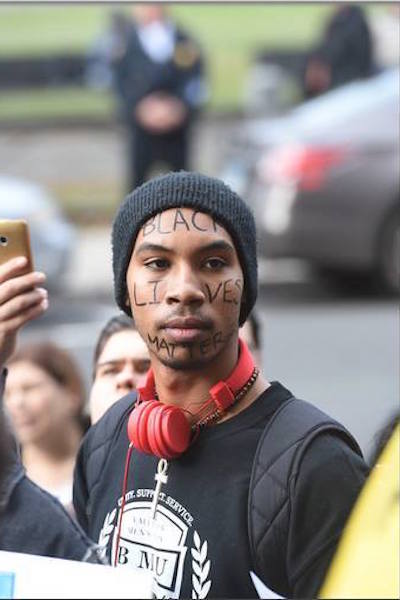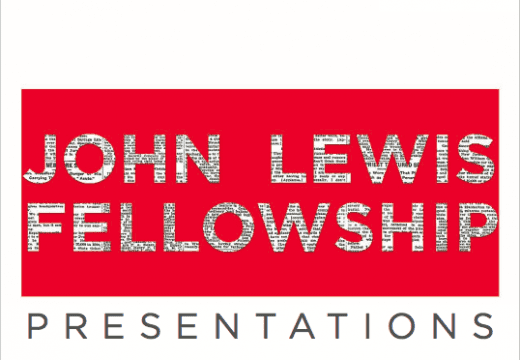Details
Article
I was enthusiastic about heading to Atlanta to join the John Lewis Fellowship until a few days before it was time to catch my flight. I was familiar with most of the assigned reading from my time as an ethnic studies major, so the content of the works only increased my budding excitement for the program. Seeing the diversity of the people interested in immersing themselves in the John Lewis Fellowship made me very hopeful about the future of activism.
In that moment I realized that I had spent the vast majority of my time, energy, and labor as an activist and an ethnic studies scholar fighting with those that Martin Luther King Jr. deemed “the white moderate.”
Until I got into a heated discussion, over a racial issue which in of itself was largely inconsequential, with a person who deemed himself an ally. The content of the argument was unimportant, but over the course of the conversation, the person showed an unwillingness to actually listen to and engage with the people with whom he was supposedly standing in solidarity. He displayed that he would talk over and down to Black people and other people of color when their visions for self-actualization didn’t align with his own. He continued to call himself an “ally”, even when the people conversing with him agreed that the descriptor didn’t suit his actions when he was called on to be self-reflective and instead became defensive.
Following that, I became so tired. In that moment I realized that I had spent the vast majority of my time, energy, and labor as an activist and an ethnic studies scholar fighting with those that Martin Luther King Jr. deemed “the white moderate.” Whether it was “progressive” professors and academics who continue to dismiss the importance of marginalized voices in academia, activists who continue to degrade communities for taking direct action that makes them uncomfortable, humanitarians that will only entertain palatable Black revolutions, or politicians who deploy Black struggles during election seasons in order to paint themselves as the best alternative, but ignore or perpetuate our plight in any other moment; I realized I have spent an incredible amount of time fighting against people who paternalistically tell me they have my best interests at heart, and would stand with me if only I act within the boundaries of their comfort and convenience. I had lost hope that Humanity in Action would be any different; I became convinced the program would simply pay lip service to liberation while hijacking and coopting whichever Black leaders and historical narratives fit its agenda.
The John Lewis Fellowship turned out to be one of the most empowering programs I have ever experienced.
Fortunately, the John Lewis Fellowship turned out to be one of the most empowering programs I have ever experienced. There are many more reasons for this than I can possibly talk about in the short word limit I have been given. I could dedicate pages to simply talking about how perfect the city of Atlanta is as both a location to discuss human and civil rights, and a great place to spend several weeks. I would love to dedicate this reflection to the incredible people I have met and have grown to care deeply for, and the amazing intellectual discussions we have shared both in and outside of the program’s lectures. The sheer amount of history I have encountered this past month could fill several books on their own. However, I want to instead focus on how the prioritization of Black voices in the teaching of Black history and Black resistance helped me re- conceptualize my own identity as an activist spur me on a long- necessary journey towards self- growth.
The prioritization of Black voices in the teaching of Black history and Black resistance helped me re- conceptualize my own identity as an activist spur me on a long- necessary journey towards self- growth.
On even the most surface level, the collection of Black excellence and high-achieving Black scholars is not something that is often encountered, even in the discussion of issues affecting Black communities. So often, in my experience, there exists this unspoken assumption that a majority or all-Black faculty cannot provide a wide enough breadth of perspective to any discussion, even one explicitly concerning race. However well versed the scholars may be in their respective fields usually means nothing to this assumption that whiteness is needed for objectivity or balance, while the reverse, majority to all-white faculties dominating discussions and educational experiences, is rarely interrogated. While there was great diversity among the races, ethnicities, fields of study, and job backgrounds of the lecturers in this fellowship, the curriculum was unmistakably and unapologetically dedicated to the uplifting of Black voices. For the first time in my academic career, I was told that I am enough; my Black voice can be enough. Even the non-Black lecturers were largely still people of color, and it felt so good to see people of color speaking for themselves in the fight for global liberation.
While there was great diversity among the races, ethnicities, fields of study, and job backgrounds of the lecturers in this fellowship, the curriculum was unmistakably and unapologetically dedicated to the uplifting of Black voices.
Interacting with so many Black professors also allowed for a reclaiming of the narrative surrounding race relations in the United States. There’s the history that is in the textbooks, on the news channels, and that usually dominates academia that relegates slavery and racism in the United States within explicit spatial and temporal boundaries; it reduces Black revolutionaries to harmless platitudes and conflates resistance with violence. Humanity in Action and the John Lewis Fellowship allowed room for Black voices to deconstruct and reexamine the long history of Black rebellion in the American context. They reached out from an often ignored Black consciousness to touch and connect with marginalized people the whole world over. Purposefully dividing narratives of violence vs. nonviolence gave way to explorations of self- defense as self- love and empowerment. In this exploration, I learned more about making sure to empower and love myself so that I may better serve my community. I learned that empowering my community can lead to the love of others outside of that community, as we learn to humanize in us what has been degraded, and rediscover that humanity that connects us all. Learning to unlearn and deconstruct oppressive and/or erasing narratives is an invaluable tool in any fight for human rights.
I now know I have allies across the world that I can rely on.
The John Lewis Fellowship was reinvigorating; a new source of an energy to continue the fight when I was at my weariest. It was amazingly inspiring. For a while now, I’ve been saying I plan on getting my doctorate. After meeting over a dozen Black PhDs who all overcame similar dismissals of their intelligence and expertise as I have throughout my educational experience, I now fully believe that me earning my doctorate is not only possible – it’s mandatory. I no longer feel alone in this fight for human rights. I now know I have allies across the world that I can rely on. I realize that I want to do what the lecturers, professors, and programs directors did throughout this program; empower others through teaching and give something to the people who will come after me. When I arrived in Atlanta, I was exhausted, believing I could never light a large enough fire to make any real change. Now I realize I only have to teach others how to create sparks.
Having been inspired by the program, my Fellows, the staff, the topics discussed, and the themes of self-care and empowerment, I began to write poetry for the first time in several years. For me, the writings represent a journey towards self-love and self-empowerment that was brought on by the welcoming and encouraging atmosphere of the John Lewis Fellowship. The program showed me the importance of dealing with and recognizing Black trauma so that we can begin to heal, as individuals and as a society. For my presentation I performed spoken word. Here is one of the pieces I performed:
My tears look like
Kids bleeding out on asphalt
And in playgrounds
Brightly colored skittled
Falling from limp hands into a blooming red rose
Plucked quickly for having the audacity
To grow through the cracks in the sidewalk
They feel like broken spines and crushed bodies
And sound like
Voices crying out
Pouring the last of their existences into the demand for the right to inhale Suddenly silenced
My fear looks like
Nonexistence
Trying to balance on a small foothold
In the midst of blackness
In the midst of whiteness
Knowing whether I’m pushed, slip, or jump
Falling had always been the plan
My fear looks like my reflection in your eyes
As you glance back over your shoulder for the third time
They contain monsters
And fingers twitch towards buttons
Towards triggers
To call down your angel
To exorcise your demons that have been embodied in me
My anger looks like
A raised fist
Gripping the night
Ready to rip down the stars
So that the planets can look down and see constellations
Burned into the cities that built themselves on our backs
It’s black smoke curling into fingers
Ready to strike back a the settlers who invade our communities And a lone figure
Throat and eyes bursting with fire
Prepared to stare down armies
With only a stone I hand and defiance in their voice
My heart looks like
Shattered
Dehumanized bodies
Strewn throughout generations
And haphazardly pieced together
Ignoring the parts of me that lie lost and forgotten beneath oceans and mass graves It is bloated and swollen
Looks blue but tastes red Like strange fruit
It beats to ancestral drums
And forces the cosmos through me when life began to its rhythm During the day
It is my war song
In the black
It is strong
It takes in the world
And whispers of revolution


